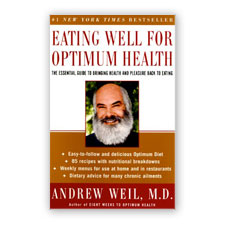Eating Well for Optimum Health

Dr. Weil says the optimum diet should have variety covering all nutritional bases and minimizing foods that have harmful elements. The more fresh foods, the better.
Decrease the amount of processed foods you eat. Consume plenty of fruits and vegetables which are loaded with protective phytochemicals.
Most adults should consume between 2,000 and 3,000 calories a day, depending on body size and activity level. Between 50 and 60 percent of your diet should come from carbohydrates, 30 percent from fat and 10 to 20 percent from protein.
Carbohydrates should not be overly processed. Instead you should eat some low glycemic index carbohydrates with every meal in the form of whole grains, beans, vegetables and nontropical foods. Reduce consumption of foods made with wheat flour and sugar, while increasing your intake of legumes. Women should eat about 225 to 270 grams of carbohydrates a day, while men should consume about 288 to 345 grams.
If you are consuming 2,000 calories a day, only 600 calories should come from fat. This should be 1 part saturated fat, 2 parts monounsaturated fat and one part polyunsaturated fat. Limit your intake of butter, cream, cheese, unskinned chicken, fatty meats and foods made with coconut and palm oil. Reduce polyunsaturated vegetable oils and increase your intake of oily fish, eggs, soybeans, walnuts, or hemp and flaxseed. Margarine, shortening, foods made with partially hydrogenated oils and fried foods should be eliminated.
Daily protein intake should be between 50 to 100 grams. Stock up on vegetable protein and less animal protein with the exception of fish and reduced fat dairy products. Your daily fiber intake should be 40 grams that can be received from fruits (berries), vegetables (beans) and whole grains.
Protective phytochemicals defend the body against cancer and degenerative diseases. They are found in fruits, vegetables, mushrooms and tea, specifically green tea. Drink six to eight glasses of water a day.
